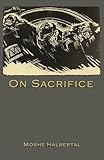On Sacrifice / Moshe Halbertal.
Material type: TextPublisher: Princeton, NJ : Princeton University Press, [2012]Copyright date: ©2012Edition: Course BookDescription: 1 online resource (152 p.)Content type:
TextPublisher: Princeton, NJ : Princeton University Press, [2012]Copyright date: ©2012Edition: Course BookDescription: 1 online resource (152 p.)Content type: - 9780691152851
- 9781400842353
- Sacrifice
- Self-sacrifice
- PHILOSOPHY / Ethics & Moral Philosophy
- Christianity
- God
- Jewish life
- Judaism
- Paul Kahn
- Western religious life
- agent-relative actions
- attentiveness
- categorical imperative
- charity
- civilians
- competition
- cooperation
- dependency
- ethical life
- ethics
- evolutionary biology
- exchange
- general will
- golden rule
- heroic sacrifices
- humans
- individuals
- instrumental relationship
- laws of war
- love
- loyalty
- martyr
- modern state
- moral sphere
- original position
- other
- past sacrifice
- political bond
- political life
- political order
- political violence
- politics
- prayer
- psychoanalysis
- religion
- religious life
- reliigous communities
- retroactive desecration
- ritual
- sacrifice
- sacrificial community
- sacrificial system
- sacrificing for
- self-interest
- self-sacrifice
- self-transcendence
- self
- social contract
- soldiers
- sovereign
- state
- suffering
- temple worship
- utilitarianism
- violence
- war
- 203.4 23
- BL570 .H35 2017
- online - DeGruyter
- Issued also in print.
| Item type | Current library | Call number | URL | Status | Notes | Barcode | |
|---|---|---|---|---|---|---|---|
 eBook
eBook
|
Biblioteca "Angelicum" Pont. Univ. S.Tommaso d'Aquino Nuvola online | online - DeGruyter (Browse shelf(Opens below)) | Online access | Not for loan (Accesso limitato) | Accesso per gli utenti autorizzati / Access for authorized users | (dgr)9781400842353 |
Frontmatter -- Contents -- Acknowledgments -- Introduction -- Part I. Sacrificing to -- Part II. Sacrificing for -- Conclusion -- Notes -- Index
restricted access online access with authorization star
http://purl.org/coar/access_right/c_16ec
The idea and practice of sacrifice play a profound role in religion, ethics, and politics. In this brief book, philosopher Moshe Halbertal explores the meaning and implications of sacrifice, developing a theory of sacrifice as an offering and examining the relationship between sacrifice, ritual, violence, and love. On Sacrifice also looks at the place of self-sacrifice within ethical life and at the complex role of sacrifice as both a noble and destructive political ideal. In the religious domain, Halbertal argues, sacrifice is an offering, a gift given in the context of a hierarchical relationship. As such it is vulnerable to rejection, a trauma at the root of both ritual and violence. An offering is also an ambiguous gesture torn between a genuine expression of gratitude and love and an instrument of exchange, a tension that haunts the practice of sacrifice. In the moral and political domains, sacrifice is tied to the idea of self-transcendence, in which an individual sacrifices his or her self-interest for the sake of higher values and commitments. While self-sacrifice has great potential moral value, it can also be used to justify the most brutal acts. Halbertal attempts to unravel the relationship between self-sacrifice and violence, arguing that misguided self-sacrifice is far more problematic than exaggerated self-love. In his exploration of the positive and negative dimensions of self-sacrifice, Halbertal also addresses the role of past sacrifice in obligating future generations and in creating a bond for political associations, and considers the function of the modern state as a sacrificial community.
Issued also in print.
Mode of access: Internet via World Wide Web.
In English.
Description based on online resource; title from PDF title page (publisher's Web site, viewed 29. Jul 2021)


